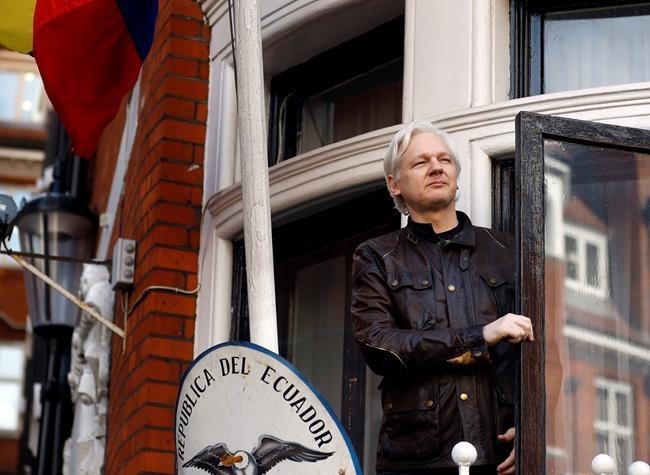
FILE - In this Friday, May 19, 2017 file photo, WikiLeaks founder Julian Assange looks out from the balcony while claiming political asylum at the Ecuadorian embassy in London. Swedish prosecutors are to reopen rape case against WikiLeaks founder Julian Assange, a month after he was removed from the Ecuadorian Embassy in London. (AP Photo/Frank Augstein, File)
May 13, 2019 - 7:49 AM
LONDON - The founder of anti-secrecy group WikiLeaks, Julian Assange, is wanted by prosecutors in two countries - the United States and Sweden - and he is currently imprisoned in a third - Britain. The tug-of-war stems from different alleged criminal acts. This is how Assange ended up with legal woes on multiple fronts:
___
WHAT IS ASSANGE'S LEGAL STATUS?
The 47-year-old Assange is locked up at Belmarsh Prison on the outskirts of London serving a 50-week sentence for jumping bail in Britain. But his legal problems do not stop there. U.S. prosecutors want him brought to the United States to face charges of allegedly conspiring with former Army intelligence analyst Chelsea Manning to hack into a Pentagon computer system. Swedish prosecutors said Monday they are reviving a rape investigation of Assange and will also seek his extradition.
___
WHY IS SWEDEN'S RAPE INQUIRY ACTIVE AGAIN?
Swedish officials started investigating in 2010 and dropped the case in 2017 because Assange had avoided extradition by obtaining political asylum inside the Ecuadorian Embassy in London, making it difficult for prosecutors to move the case forward. Ecuador's government withdrew his political protection in April and British police arrested Assange at the embassy hours later. Swedish officials now believe they can extradite Assange to Sweden for questioning and a possible trial.
___
WHICH COUNTRY WILL GET ASSANGE FIRST?
That's not clear yet. Sweden hasn't yet made a formal extradition request. It will be up to a British court — and ultimately, Britain's home secretary, a senior Cabinet official who has the government's final say on extradition matters — to determine which claim takes priority. British officials will consider several factors, including the seriousness of the charges and the order in which the requests were received, when deciding which case takes precedence. Some British lawmakers argue that Sweden's claim must receive top priority, but the decision is not up to Parliament.
___
HOW WILL THE COURT DECIDE WHETHER TO GRANT THE EXTRADITION REQUESTS?
The extradition proceeding will not be an evaluation of the evidence against Assange. Instead, the British judge will focus on whether the offences he is accused of would be a crime in Britain along with other factors, including human rights considerations and how long it's been since the illegal acts allegedly took place. British courts will not extradite a person who could be sentenced to death for an alleged crime, but that won't be a factor in this case unless additional charges are filed since the U.S. charge carries a maximum prison term of five years and Sweden does not impose capital punishment.
___
ISN'T ASSANGE'S WORK PROTECTED BY THE FIRST AMENDMENT?
A grand jury indicted Assange on a charge of conspiracy to commit computer intrusion. If the case goes to trial, U.S. officials are expected to argue the alleged plot with Manning to break into a classified Pentagon computer system threatened national security and was not directly related to his publishing activities. Assange's defence lawyers are likely to claim his actions were those of a legitimate journalist dealing with a source and are thus protected by the First Amendment.
News from © The Associated Press, 2019